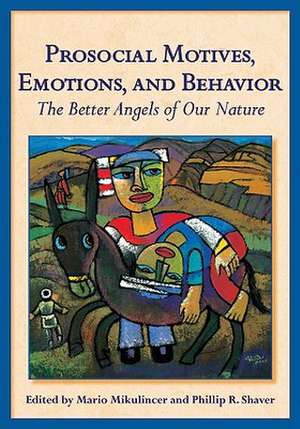Prosocial Motives, Emotions, and Behavior – The Better Angels of Our Nature: Herzliya Series on Personality and Social Psychology
Autor Mario Mikulincer, Phillip R. Shaveren Limba Engleză Hardback – 14 oct 2009
Preț: 252.82 lei
Preț vechi: 295.82 lei
-15% Nou
Puncte Express: 379
Preț estimativ în valută:
48.39€ • 52.58$ • 40.68£
48.39€ • 52.58$ • 40.68£
Carte indisponibilă temporar
Doresc să fiu notificat când acest titlu va fi disponibil:
Se trimite...
Preluare comenzi: 021 569.72.76
Specificații
ISBN-13: 9781433805462
ISBN-10: 1433805464
Pagini: 468
Dimensiuni: 199 x 261 x 32 mm
Greutate: 1.02 kg
Editura: Wiley
Seria Herzliya Series on Personality and Social Psychology
ISBN-10: 1433805464
Pagini: 468
Dimensiuni: 199 x 261 x 32 mm
Greutate: 1.02 kg
Editura: Wiley
Seria Herzliya Series on Personality and Social Psychology
Notă biografică
Cuprins
Contributors
Preface
Introduction
I. Theoretical Perspectives
- Empathy-Induced Altruistic Motivation
—C. Daniel Batson - Evolutionary Perspectives on Prosocial Behavior
—Jeffry A. Simpson and Lane Beckes - Enduring Goodness: A Person-by-Situation Perspective on Prosocial Behavior
—Louis A. Penner and Heather Orom - A Behavioral-Systems Perspective on Prosocial Behavior
—Phillip R. Shaver, Mario Mikulincer, and Moran Shemesh-Iron - Forms of Concern: A Psychoanalytic Perspective
—Rami Tolmacz - Neuroscience Meets Social Psychology: An Integrative Approach to Human Empathy and Prosocial Behavior
—Grit Hein and Tania Singer
II. Psychological Processes
- Empathy-Related Responding: Links With Self-Regulation, Moral Judgment, and Moral Behavior
—Nancy Eisenberg - Genetic and Environmental Influences on Prosocial Behavior
—Ariel Knafo and Salomon Israel - The Effortful and Energy-Demanding Nature of Prosocial Behavior
—Matthew T. Gailliot - Helping Relations as Status Relations
—Arie Nadler, Samer Halabi, Gal Harapz-Gorodeisky, and Yael Ben-David - Compassionate Callousness: A Terror Management Perspective on Prosocial Behavior
—Gilad Hirschberger - Basic Values: How They Motivate and Inhibit Prosocial Behavior
—Shalom H. Schwartz
III. Prosocial Emotions
- Compassionate Love as a Prosocial Emotion
—Beverley Fehr - Does Gratitude Promote Prosocial Behavior? The Moderating Role of Attachment Security
—Mario Mikulincer and Phillip R. Shaver - The Malleability of Forgiveness
—Johan C. Karremans and Paul A. M. Van Lange - The Subjective Experience of Generosity
—Eliane Sommerfeld
IV. Prosocial Behavior at the Relational Level
- Prosocial Motivation and Behavior in Close Relationships
—Caryl E. Rusbult and Christopher R. Agnew - Forgiveness: Integral to a Science of Close Relationships?
—Frank D. Fincham - Responding to Need in Intimate Relationships: Social Support and Caregiving Processes in Couples
—Nancy L. Collins, Máire B. Ford, AnaMarie C. Guichard, Heidi S. Kane, and Brooke C. Feeney
V. Prosocial Behavior at the Group and Societal Levels
- Empathy and Intergroup Relations
—John F. Dovidio, James D. Johnson, Samuel L. Gaertner, Adam R. Pearson, Tamar Saguy, and Leslie Ashburn-Nardo - A Needs-Based Model of Reconciliation: Perpetrators Need Acceptance and Victims Need Empowerment to Reconcile
—Nurit Shnabel and Arie Nadler - Overcoming Psychological Barriers to Peacemaking: The Influence of Beliefs About Losses
—Daniel Bar-Tal and Eran Halperin
Index
About the Editors



